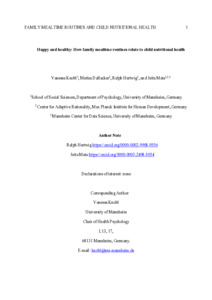|
Happy and healthy: How family mealtime routines relate to child nutritional health
Knobl, Vanessa
;
Dallacker, Mattea
;
Hertwig, Ralph
;
Mata, Jutta
![[img]](https://madoc.bib.uni-mannheim.de/61326/1.hassmallThumbnailVersion/Manuscript%20Happy%20and%20healthy_revised.pdf)  Vorschau |
|
PDF
Manuscript Happy and healthy_revised.pdf
- Angenommene Version
Download (543kB)
|
|
DOI:
|
https://doi.org/10.1016/j.appet.2022.105939
|
|
URL:
|
https://www.sciencedirect.com/science/article/abs/...
|
|
Weitere URL:
|
https://www.researchgate.net/publication/357942682...
|
|
URN:
|
urn:nbn:de:bsz:180-madoc-613263
|
|
Dokumenttyp:
|
Zeitschriftenartikel
|
|
Erscheinungsjahr:
|
2022
|
|
Titel einer Zeitschrift oder einer Reihe:
|
Appetite : Multidisciplinary Research on Eating and Drinking
|
|
Band/Volume:
|
171
|
|
Heft/Issue:
|
Article 105939
|
|
Seitenbereich:
|
1-9
|
|
Ort der Veröffentlichung:
|
Amsterdam [u.a.]
|
|
Verlag:
|
Elsevier
|
|
ISSN:
|
0195-6663 , 1095-8304
|
|
Sprache der Veröffentlichung:
|
Englisch
|
|
Einrichtung:
|
Fakultät für Sozialwissenschaften > Gesundheitspsychologie (Mata 2015-)
|
|
Fachgebiet:
|
150 Psychologie
|
|
Abstract:
|
Children eat most of their meals in a family context, making family meals a key environment in which to learn about healthy food. What makes a family meal “healthy”? This diary study examined the practice of seven family mealtime routines (e.g., positive mealtime atmosphere, parental modeling, and longer meal duration) and their predictive value for children's healthier nutrition focusing on everyday family meal settings.
Over 7 consecutive days, parents from N = 310 families (Mage = 42 years) described their most important family meal of the day and food intake for an index child (Mage = 9 years) and indicated what mealtime routines were practiced during the family meal. On average, each parent responded to 5.6 (SD = 1.4) of seven daily surveys. Mean correlations between mealtime routines were small (rs between −0.14 and 0.25), suggesting independent and distinct routines. Creating a positive atmosphere and turning TV and smartphones off were reported most often (on average, 91.2% and 90.5%, respectively). Parent's fruit and vegetable intake and creating a positive mealtime atmosphere were the strongest predictors for children's higher nutritional quality (i.e., higher vegetable and fruit intake; ps < .001). Findings indicate that mealtime routines obtained from independent meta-analyses represent distinct routines. Families practiced these independent and distinct routines to different degrees. Parental modeling and a positive mealtime atmosphere were most predictive of healthier child nutrition in daily family meal settings. More experimental research is needed to better understand causality and provide a better basis for effective interventions.
|
|
Zusätzliche Informationen:
|
© 2022. The attached manuscript version is made available under the CC-BY-NC-ND 4.0 license https://creativecommons.org/licenses/by-nc-nd/4.0/
|
 | Dieser Eintrag ist Teil der Universitätsbibliographie. |
 | Das Dokument wird vom Publikationsserver der Universitätsbibliothek Mannheim bereitgestellt. |
 Suche Autoren in Suche Autoren in
BASE:
Knobl, Vanessa
;
Dallacker, Mattea
;
Hertwig, Ralph
;
Mata, Jutta
Google Scholar:
Knobl, Vanessa
;
Dallacker, Mattea
;
Hertwig, Ralph
;
Mata, Jutta
ORCID:
Knobl, Vanessa ; Dallacker, Mattea ; Hertwig, Ralph ; Mata, Jutta  ORCID: 0000-0003-2498-5054 ORCID: 0000-0003-2498-5054
Sie haben einen Fehler gefunden? Teilen Sie uns Ihren Korrekturwunsch bitte hier mit: E-Mail
Actions (login required)
 |
Eintrag anzeigen |
|
|
 ORCID: 0000-0003-2498-5054
ORCID: 0000-0003-2498-5054



 Suche Autoren in
Suche Autoren in